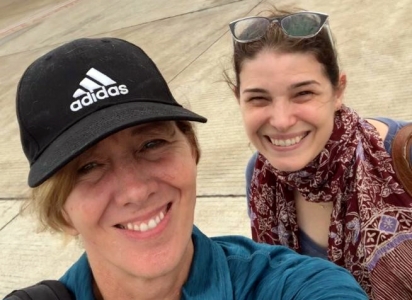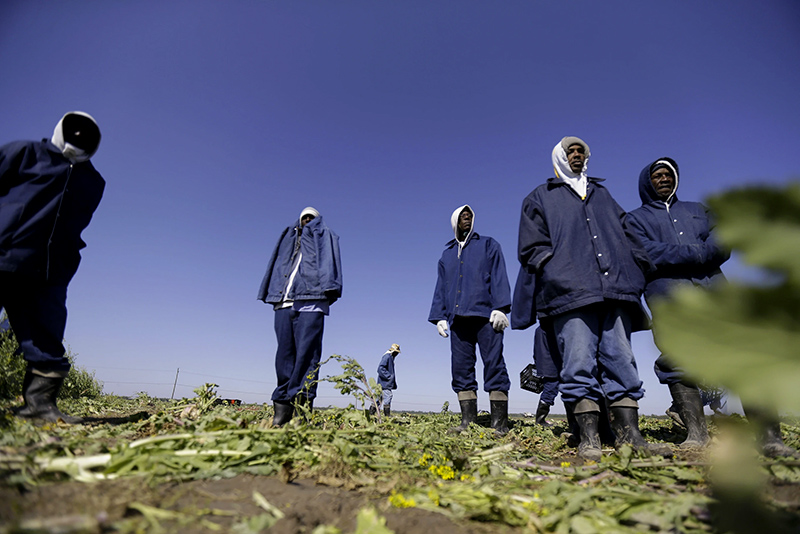2025 SEIU Award for Reporting on Racial and Economic Justice

Robin McDowell and Margie Mason
Prison labor produces some of our most popular and profitable products. Associated Press reporters Margie Mason and Robin McDowell spent two years investigating prison labor in the United States and were able to draw two direct lines. One connected the work of today’s incarcerated workers with some of the most profitable corporations in the country, including Burger King, Walmart, Whole Foods, Trader Joe’s, and Kroger brands. The other showed a throughline between today’s practices and what happened during slavery and convict leasing following the Civil War. That is when Black men were rounded up on petty charges and forced to work for private companies under deadly conditions in places like coal mines, helping to build American business empires.

The reporters filed public records requests in all 50 states, seeking the names of companies that bought crops and livestock from prison farms over the past five years, and the value of their contracts. When corrections departments balked, the journalists put boots on the ground and followed the money.
McDowell moved to New Orleans and set up a base. She went to Louisiana’s state penitentiary and waited. She followed a load of prisoner-raised cattle from the prison gates to an auction house in Baton Rouge, then on to a slaughterhouse 600 miles away in Texas. That’s where the reporters had their first big surprise: The beef was being sold to major companies, including Burger King and Walmart.
They went on to crisscross the country, staking out prisons and county jails while also tailing inmate transfer vans to work release sites such as Tyson Foods and fast-food restaurants.
Prison laborers are subjected to gruelling working conditions. During his 28 years in Arkansas jails, guards routinely sent Kaleem Nazeem to solitary confinement for refusing to pick cotton alongside rows of other Black men, in triple-digit heat.
Prison laborers who refuse to work may jeopardize their chances of parole. Those who do work may risk their lives. They don’t have the training, the experience or the protective equipment guaranteed to almost all other full-time workers.
Mason and McDowell wanted to know: How is this still going on? What happens when incarcerated workers are hurt or killed on the job? And which businesses are profiting off these prisoners, who disproportionately are people of color and forced to work for pennies an hour or nothing at all?
They showed readers how a spider web of prison-made products ends up in grocery stores like Whole Foods and Kroger, in brands from Cheerios and Gold Medal Flour to Ball Park brand hot dogs. Their reporting also exposed how these goods were being exported across the globe, even though the U.S. government bans the import of prison-made products from other countries.
Curtis Davis, a former inmate of Angola, in Louisiana, the largest maximum-security prison in the U.S., says he is fighting to change state laws that allow forced labor in prisons. “Slavery has not been abolished,” he says, “It is still operating in present tense. Nothing has changed.”
Margie Mason and Robin McDowell spent nearly two decades working together as foreign correspondents in Southeast Asia covering everything from bloody coups and al-Qaida-linked terrorist attacks to plane crashes, tsunamis and the ethnic cleansing of Rohingya Muslims. They were part of a four-woman team that won the 2016 Pulitzer Prize for Public Service for a series of stories about slavery in the seafood industry that led to the freeing of more than 2,000 men, arrests, seizures of assets and changes to U.S. law. They have also exposed labor abuses in the palm oil industry in Indonesia and Malaysia, ranging from slavery and child labor to rape in the fields. That project received the Hillman Prize in 2021 and was named a Pulitzer finalist, among others. Their work in 2020 also led to the freedom of a Minnesota man sentenced to life as a juvenile in 2002. They continue to focus on the world’s most vulnerable, including minorities and others who are persecuted because of their race, religion, gender or social status.

